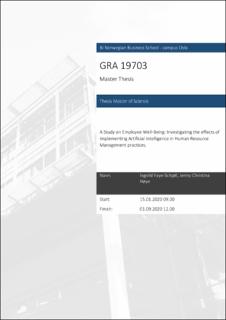A Study on Employee Well-Being: Investigating the effects of implementing Artificial Intelligence in Human Resource Management practices.
Master thesis

View/
Date
2020Metadata
Show full item recordCollections
- Master of Science [1621]
Abstract
The following study investigates the growing digitalization in a contemporary
society and, particularly, how it is influencing the human resource management
field. With burgeoning technology, we look to new solutions on how managers
can measure and uphold employee well-being by introducing artificial intelligence
as a means. The innovative company, Winningtemp, is set to be the benchmark of
our study as they have provided organizations with new solutions, allowing
managers continuous insight into their employees’ work-life-cycle. The
emergence of digitalization over the past decades and the continuous evolvement
of technologies justifies the relevance of our study. Nevertheless, the critical
phase organizations are currently facing due to Covid-19, requiring rapid change
and digital solutions in order to keep operating.
Human resource scholars emphasise how employee well-being has not been a
central research topic within the field (Ho & Kuvaas, 2019). Arguably though,
employee well-being and performance are interconnected, supporting the fact that
employees’ health should be a topic of interest for managers. Kuvaas, Buch and
Dysvik (2016) further emphasise how performance management should indeed be
a continuous process, yet many organizations still rely on traditional methods,
limiting performance management practices to once or twice per year. The present
research, therefore, seeks to understand whether agile performance management
tools might be a more sufficient solution in enhancing healthy and essentially
prosperous workplaces.
A quantitative study of 93 individuals was conducted to compare companies
utilising human resource tools assisted by artificial intelligence, with traditional
tools. Specifically, the study found that by adopting agile tools to performance
management practices, organizations generated higher levels of employee wellbeing
in terms of social-psychological functioning. Further, the results show that
employees exposed to new-technological tools report lower on economic leadermember
exchange relationships. Nonetheless, managers and line-managers within
these companies engage in human resource practices on a more frequent basis and
are generally more satisfied with their tools to approach employees.
Description
Masteroppgave(MSc) in Master of Science in Leadership and Organizational Psychology - Handelshøyskolen BI, 2020